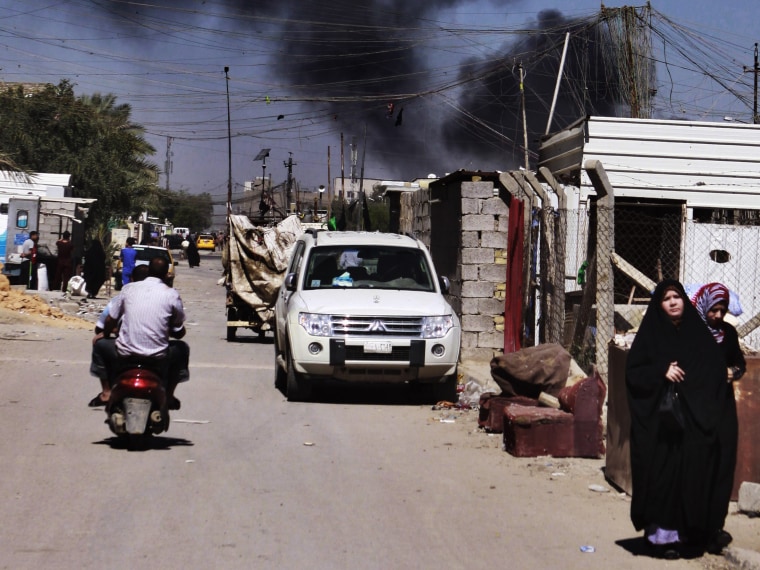I first met Alyaa in June 2003 at our forward-operating base in south-central Baghdad. We didn’t have enough Arabic translators in the Army, partially because it seemed many had been kicked out under the discriminatory “Don’t Ask, Don’t Tell” policy. Alyaa, a recent Baghdad University graduate who spoke fluent English, French, and Arabic, showed up at our at our base, which was bustling with dozens of agitated Iraqis trying to get water, food, and medical care. Alyaa looked like any other recent college student—dressed in jeans and a long-sleeved shirt, looking to help out. She was eventually hired as a translator, and after seeing her hard-work, we brought her onto our small team.
“Princess Alyaa,” as we came to call her, traveled with our unit across Baghdad as an indispensable part of our team. During our tour in Iraq, Alyaa was not just our interpreter, she was our guardian angel. Every day, our lives were in her hands. More than once, she calmed down an aggravated Iraqi who threatened to do us harm. Alyaa’s service to the United States came at considerable risk to herself and to her family. While we slept in a fortified base, with only mortars being a true and constant threat, Alyaa returned to a neighborhood where there was no one to protect her from the militants who viewed her as a traitor to her country and her people.
When the 82nd Airborne Division left south-central Baghdad in January 2004, Princess Alyaa's life soon changed for the worse. She and her family began receiving threats at their home for helping coalition forces. The message was simple, "You help the people you're supposed to fight. You deserve death.” Shiite extremists killed her uncle and kidnapped and tortured her cousin because of her family's ties to coalition forces.
On December 31, 2005, Alyaa became one of the 4.7 million Iraqis who fled their homes over the course of the Iraq War. She, along with her brother and her cousin, escaped to Jordan where Alyaa applied for refugee status in the United States. Her application was rejected.
When I came home, I eventually joined a Philadelphia law firm, where I heard of a great immigration attorney, Elena Park. On one of my first days I introduced myself and asked her if she wouldn't mind helping one of my friends for free—Princess Alyaa. She's graciously did.
Elena worked with Alyaa for years, helping her apply repeatedly for both refugee status and a student visa. For her work on Alyaa’s case, Elena won a Pro Bono Publico Award for Outstanding Service from the American Bar Association. Even with Elena’s help, Alyaa’s application for refugee status was rejected multiple times—once because of an interview that didn't go well in Jordan but, at other times, for what seemed like arbitrary reasons. Alyaa received a student visa only on her third attempt.
After years of failed applications and fading hopes, Alyaa finally received a student visa to come to the United States in 2007, where she earned her Masters of International Peace and Conflict Resolution at Arcadia University in 2010.
That year, Congress passed the Refugee Crisis in Iraq Act to protect Iraqis like Alyaa who face persecution for their work with the U.S. military or government during the Iraq War. The act created a “Special Immigrant Visa” program intended to provide visas for up to 25,000 U.S.-affiliated Iraqis under threat of persecution—folks just like Alyaa. Yet, as of 2013, more than 18,000 of those visas remain unused according to estimates by The List Project, which has helped bring more than 1,500 U.S. affiliated Iraqis to safety since 2007.
Alyaa was lucky. She escaped Iraq before she was harmed, and she won the help of a top-notch lawyer who worked valiantly to shepherd her through the bureaucratic visa application process. Yet, as the New York Times notes in an excellent piece this month, more than 40,000 Iraqis like Alyaa remain in danger. Not all of them will be as lucky.
In the words of President Obama, “we must keep faith with the Iraqis who kept faith with us.” The Iraq War is over, and American troops have come home, but the refugee crisis continues. Congress and the president must work to ensure that the Iraqis and the Afghans who risked their lives to support our troops receive the protection they have earned.
This past Monday, Iraqi native Alyaa Abood sat in a cramped room with 60 other immigrants and their families, nervously waiting to take an oath to become a United States citizen. Unbeknownst to her fellow newest Americans, this vibrant 32-year-young woman had already risked her life for her new country—on the streets of Baghdad as a translator for the Army's 82nd Airborne Division. The United States has a moral obligation to stand with those who risked so much to support our troops. By welcoming these brave men and women into our country, we’ll not only repay our debt, but we’ll continue a long tradition of bringing in the best and the brightest from beyond our borders to become part of our American family.
